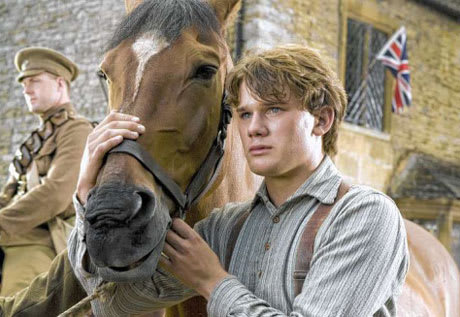Based on the 1982 children's novel of the same name by Michael Morpurgo, and acknowledging the 2007 stage adaptation, Steven Spielberg's cinematic interpretation of War Horse is both a brilliantly constructed love letter to the epics of yesteryear and an intensely misguided failure of contrived, naïve sentiment.
War Horse is a film that surges with intensely orchestrated set pieces and heartbreakingly appropriate cinematography of muddied battlefields and amber-hued sunsets that are inevitably ruined by the cloying close-ups and constantly forced perspective.
This perspective is primarily that of anthropomorphized manipulation, as the film follows Joey, a young horse, beginning with his unlikely triumph over farming equipment, saving the home and livelihood of Rose (Emily Watson) and Ted Naracott (Peter Mullan), much to the delight of their idealistic, single-minded son, Albert (Jeremy Irvine).
Since this is a story about the heartache of war and the power of never giving up, Joey is sold to the cavalry during WWI, eventually winding up with the Germans, a young French girl and in the midst of a dangerous battlefield with bullets and cannons firing relentlessly.
Acknowledging that Spielberg's scene construction is perpetually astounding, ramping up tensions and emotional investment throughout all of Joey's trials and tribulations, the narrative crux of an exceptionally perceptive and discerning horse – he literally sacrifices himself for another horse, seemingly able to understand English, German and the entire gamut of non-verbal signifiers – is often quite distracting. It's also difficult to take a dramatic film about the war seriously when there's a sassy goose running about and a trench full of injured men in the midst of battle stop to chat about a horse.
To expand upon the degree of contrivance would ultimately ruin the film, but going in with the understanding that there will be multiple close-ups of Emily Watson telling us exactly what to think and feel, with her knowing glances, might help the sugary sweetness go down a bit easier.
Moving past this, sequences such as the one where Joey finally gives into his emotions and flees through an active battle are so wondrously conceived and realized, capturing the compounded and collective frustration and rage of war succinctly, that the good manages to outweigh the bad. It's just unfortunate that this scale is tipped so slightly.
(Disney)War Horse is a film that surges with intensely orchestrated set pieces and heartbreakingly appropriate cinematography of muddied battlefields and amber-hued sunsets that are inevitably ruined by the cloying close-ups and constantly forced perspective.
This perspective is primarily that of anthropomorphized manipulation, as the film follows Joey, a young horse, beginning with his unlikely triumph over farming equipment, saving the home and livelihood of Rose (Emily Watson) and Ted Naracott (Peter Mullan), much to the delight of their idealistic, single-minded son, Albert (Jeremy Irvine).
Since this is a story about the heartache of war and the power of never giving up, Joey is sold to the cavalry during WWI, eventually winding up with the Germans, a young French girl and in the midst of a dangerous battlefield with bullets and cannons firing relentlessly.
Acknowledging that Spielberg's scene construction is perpetually astounding, ramping up tensions and emotional investment throughout all of Joey's trials and tribulations, the narrative crux of an exceptionally perceptive and discerning horse – he literally sacrifices himself for another horse, seemingly able to understand English, German and the entire gamut of non-verbal signifiers – is often quite distracting. It's also difficult to take a dramatic film about the war seriously when there's a sassy goose running about and a trench full of injured men in the midst of battle stop to chat about a horse.
To expand upon the degree of contrivance would ultimately ruin the film, but going in with the understanding that there will be multiple close-ups of Emily Watson telling us exactly what to think and feel, with her knowing glances, might help the sugary sweetness go down a bit easier.
Moving past this, sequences such as the one where Joey finally gives into his emotions and flees through an active battle are so wondrously conceived and realized, capturing the compounded and collective frustration and rage of war succinctly, that the good manages to outweigh the bad. It's just unfortunate that this scale is tipped so slightly.
